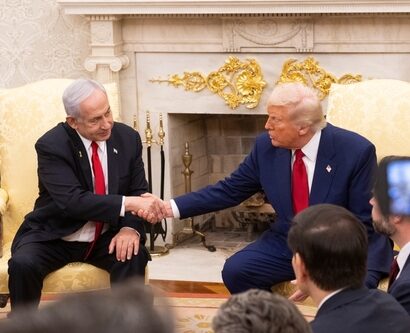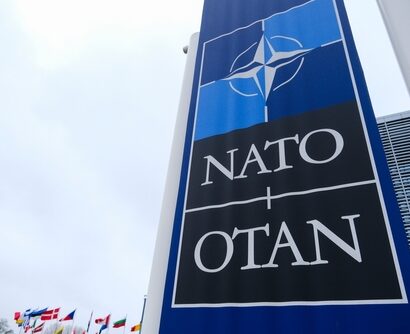Abstract: Iran’s response to the Russian invasion of Ukraine was based on support for Moscow. Iran did not condemn the attack, nor did it vote in favour of the UN General Assembly resolution condemning Russia’s attack on Ukraine, like countries such as Syria and Venezuela, and merely abstained. In fact, in the form of a policy of “look to the East” and a 20-year long-term agreement, Iran has expanded relations with Russia in order to be able to use them to the leverage of the East against the West and to ensure the survival of its political system.
Bottom-line-up-front: The reaction of Ebrahim Raisi’s government to the Ukraine war should be examined in the context of Iran’s “look to the East” policy. Under this policy, Iran is clearly seeking to distance itself further from the West and closer to Russia and China. Accordingly, Iran has considered long-term interests with Russia in the form of the Eurasian Economic Union, the Shanghai Cooperation Organization, 20 years agreement and the North-South corridor in response to the Ukraine war.
Problem statement: How does the ongoing war in Ukraine influence the future perspective of Iran’s foreign policy, the policy of “look to the East”, and does it leave any room for a broad relationship with the West and balanced foreign policy?
So what?: Excessive proximity of Iran’s foreign policy to Russia and China in the form of “look to the East” destroys the balance in Iran’s foreign policy. The Ukraine war and Russia’s use of the Iran card in the aftermath of the crisis in the nuclear negotiations show how, in the absence of a balance in Iran’s foreign policy, great powers like Russia can impose their terms even to the detriment of Iran’s national interests.

Source: shutterstock.com/Checkin
“Look to the East”
Iran’s approach to Russia’s aggression against Ukraine can be assessed in terms of the nature of the Islamic Republic of Iran’s foreign policy in general and its “look to the East” policy in particular. In general, Iran’s foreign policy is in ideological conflict with the West, and since the beginning of the 1979 revolution, Tehran has considered the West as an ideological and existential threat. Accordingly, Iran has pursued a “look to the East” policy after the Iran-Iraq war and especially during Ahmadinejad’s presidency. However, with the rise to power of Ebrahim Raisi’s government, the “look to the East” foreign policy has entered a new phase. The signing of a 25-year long-term cooperation document with China and the effort to sign a 20-year long-term cooperation document with Russia have brought Iran closer to both countries.[1]
Iran has pursued a “look to the East” policy after the Iran-Iraq war and especially during Ahmadinejad’s presidency.
In fact, Iran’s policy of “look to the East” and its (already finalized) long-term agreements with Russia and China should be considered in line with the policy of positive balance. After the 1979 Revolution, Iran’s foreign policy was based on a negative balance and the slogan “Neither East nor West.”
In a policy of negative balance, if a country feels a loss in signing a contract and terminates it with one of the world’s most powerful players, it must terminate the same privilege it has given to a competitor in order to balance this. In contrast, in a policy of positive balance, if a country feels interested in signing a treaty and concluding it with one of the most powerful international actors, it must give a similar concession to the rival country of that world power.[2]
The Reasons
However, the reasons for Iran’s favourable balance policy should be sought in several factors. Favourable policy should define changes in the polarization of the international system based on the interpretation of Iran’s political elite; It is a way to counter Western sanctions and maintain the survival of the political system.
There are multiple reasons for the development of Iran’s favourable policy:
1. Change in the polarization of the international system. Iran believes the United States is a declining power (hegemon), and the future poles of the international system are eastern, including China.
The recently published “Transformation Document” of Ebrahim Raisi’s government, part of which deals with Iran’s foreign relations, makes no reference to foreign relations with North America. In fact, in Iran’s foreign relations, there is no trace of the North American region. In the section on cooperation with trade blocs, only three blocs, the Economic Cooperation Organization (ECO), the Shanghai Cooperation Organization and the Eurasian Economic Union are emphasized.[3]
In fact, in Iran’s foreign relations, there is no trace of the North American region.
2. The officials of the Islamic Republic of Iran believe that the West has an existential problem with the nature of Iran’s political system and does not want the development and progress of Iran.
3. Proponents of relations with the West, who are mostly reformists and moderates, have been removed from the power structure of Iran, and it is unclear as to whether they may re-enter this power structure.
In this regard, Iran’s former President Khatami noted: “I am disappointed with the future of the country and the political arena and I believe that the system will severely limit reformists’ political activities. It appears that the system has passed us.” Khatami goes on to say: “We must move towards community-based reforms and the implementation of educational activities with the aim of long-term work.”[4]
One reason for this has been the gradual elimination of reformists by the “hard core of power” over the years. The removal of the reformists, and the weakening of the middle class that supported them, has taken place. The weakening of the middle class and their frustration with the political system prevented them from running in the recent parliamentary and presidential elections in Iran, and the hardliners held power so that the power structure in Iran was entirely in their hands.
One of the main reasons for the weakening of the middle class in Iran is the deteriorating economic situation of this class. Of the three deciles 5, 6 and 7, which define the middle class, two deciles 5 and 6 have become the poor class.[5]
Some of the reformists in power were opportunists who used the slogan of reformism. These people align themselves with the manipulations of the “hard core of power” to produce a friendly and harmless political force, and they dealt a real blow to this current with the flag of reformism. The reason for the middle class turning away from reformism has been the same quasi-reformist actions. In fact, these quasi-reformists were part of the problem, not the solution.[6]
4. Iranian officials support Russia’s anti-Western discourse, calling it a sign of the West’s decline.[7]
The establishment seriously pursues this policy, and the influence of Russian supporters in the structure of Iran’s political power is unprecedented. Tehran believes that the future of the international system is in the hands of powers such as China and Russia and that supporting a country like Russia will allow Iran to count on its help in domestic crises, as happened in Kazakhstan.
Tehran believes that the future of the international system is in the hands of powers such as China and Russia and that supporting a country like Russia will allow Iran to count on its help in domestic crises, as happened in Kazakhstan.
Russia’s War
Accordingly, with the beginning of the Russian invasion of Ukraine, the President of Iran, Ebrahim Raisi, in contact with Putin, confirmed his action and said: he understands Russia’s security concerns about the destabilizing activities of the United States and NATO. “NATO expansion is a serious threat to the stability and security of independent states in different regions.”[8]
In a late reaction, six days after the start of the Russian invasion of Ukraine, Iranian leader Ali Khamenei rooted the Ukraine war to US and Western policies and blamed them: “We want a ceasefire in Ukraine, and we want the war to end there, but the only cure for any crisis is if the root of the crisis is known. The root of the crisis in Ukraine is the policies of the United States and the West. These are the roots of the crisis. These should be recognized and judged based on them.”[9]
“We want a ceasefire in Ukraine, and we want the war to end there, but the only cure for any crisis is if the root of the crisis is known. The root of the crisis in Ukraine is the policies of the United States and the West.”
Reacting to the Russian attack without condemning it or naming it as aggression, Iranian Foreign Minister Hossein Amir-Abdollahian said: “The Ukraine crisis is rooted in NATO provocations.”[10]
The Permanent Representative of Iran to the United Nations, Majid Takht Ravanchi, justified the abstention in condemning Russia’s invasion of Ukraine at the UN General Assembly. He said: “We note that the current complexity and fragile situation in the Eastern European region has been exacerbated by provocative actions by the United States and NATO. In this regard, the security concerns of the Russian Federation must be taken into account.”[11]
Neither Condemnation Nor Recognition
The reasons for Iran’s calm and cautious response to the invasion of Ukraine can be traced to Iran’s relations with Russia over the past few decades, its darker relations with the West, and developments throughout the Middle East. Of course, although Iran never condemns Russia’s foreign aggression, it also never recognizes the territories controlled by Moscow. This approach can be seen in the annexation of Crimea to Russia, which Iran has not recognized. Iran does not openly support Russian military campaigns, as it may one day be used against Iran itself in some of its border provinces where there are separatist sentiments.[12]
Conservatives and their pro-government media have also widely emphasized the lack of US and NATO support for Ukraine, further isolating pro-Western currents inside Iran. Conservatives have even removed the fact that Russia once invaded Iran from textbooks of Iranian students in order to show a positive image of Russia.[13] Even with Russia’s sabotage in the last round of talks to revive the Joint Comprehensive Plan for Action (JCPOA), Iran considered Russia’s concerns understandable.
Russian Foreign Minister Sergey Lavrov announced a few days before the finalization of the Iran nuclear deal: “Russia has asked Washington to ensure that the recent sanctions against Moscow are not linked to its cooperation with Iran before the revival of the JCPOA”.[14]
In response, Ali Shamkhani, secretary of Iran’s Supreme National Security Council, said Iran understood Russia’s reasons for requesting guarantees.[15]
A Window of Opportunity?
Although some argue that the Ukraine war could open up opportunities for Iran’s energy exports to Europe, it should be noted that Iran’s gas export capacity, the world’s second-largest, is almost zero due to high domestic consumption.[16]
This is due to the lack of investment and advanced technology and knowledge to produce LNG, convert gas to liquefied gas, and strengthen the crude oil conversion industry.[17]
Increasing Iran’s export capacity requires an investment that will take several years and will not help to supply Europe with gas at this time.
Incidentally, one of the reasons Iran cannot be considered a gas exporter globally is sanctions and Russian influence. Moscow has been a major opponent of the Iran-Pakistan-India peace pipeline in order to export its gas to these countries through Central Asia. Even when Iran wanted to increase its gas export capacity to Armenia from one million cubic meters per day to 3 million cubic meters, it faced a severe obstacles from Russia.
Moscow has been a major opponent of the Iran-Pakistan-India peace pipeline in order to export its gas to these countries through Central Asia.
Russia has blocked the exploration of Iranian gas in the Chalous gas field. “Russia has blocked the extraction of Iranian gas from eight gas fields in the Caspian Sea in order to maintain its position as the largest holder of gas in the world,” said Ardeshir Dadras, president of the Iranian CNG Association.[18]
Hours after Israeli Prime Minister Naftali Bennett traveled to Moscow and met with Vladimir Putin, Israel assassinated two senior Iranian Revolutionary Guards Corps (IRGC) officers on the outskirts of Damascus. Although this is not the first time IRGC commanders and members have been killed in Syria, it is the first time that the Iranian Foreign Ministry and the Revolutionary Guards have officially confirmed the killing of IRGC commanders in Syria by Israel.[19]
It is said that Israeli attacks on Iran and its allies in Syria have always been carried out with the green light of Moscow. Recent Israeli attacks on the Iranian-controlled port of Latakia include covert Russian-Israeli cooperation in Syria.[20]
Moscow does not want Iran to have widespread influence in Syria despite extensive Iranian-Russian cooperation in Syria. On the other hand, Israel’s security is one of Russia’s red lines in Syria. Allied Iranian forces stationed near the Golan Heights retreated under Russian pressure. Moscow giving the green light to Tel Aviv for freedom of action in Syria is an attempt by Russia to distance Iran from the developments in Syria in exchange for reducing Tehran’s influence in Syria and the reconstruction process.[21]
According to some reports, following the signing of a 20-year document between Iran and Russia, Iran will become more under Russian influence, and Russia’s involvement in energy policies will increase.[22]
On the other hand, although Europe needs new energy sources, it can never look to Iran as a long-term energy source. In practice, it creates energy dependence from a country with which it has fundamental differences in various fields, including regional policy, nuclear program, missile program and drone program, and it certainly does not provide a winning card.
Of course, it is possible that the EU plus China, Russia and the US will shortly bring Iranian oil into the world market by accelerating the revival of JCPOA, which will lead to lower prices; an issue that will not be of interest to Russia. Because after the Ukraine war, Russia tends that Iran’s nuclear program will not be concluded for the time being, so the United States would be involved in this case, and Russia will be able to use the Iran card to gain concessions regarding Ukraine. On the other hand, with the entry of Iranian oil into world markets and lowering prices, US and European pressure on Russia’s energy sector would increase, and sanctions in this area would expand.
Because after the Ukraine war, Russia tends that Iran’s nuclear program will not be concluded for the time being, so the United States would be involved in this case, and Russia will be able to use the Iran card to gain concessions regarding Ukraine.
Accordingly, Russian Foreign Minister Sergei Lavrov issued a written guarantee from the United States at a time when the nuclear deal (JCPOA) with Iran seemed to be nearing final success, leaving the talks in a state of ambiguity. In order for Russian trade with Iran not to be affected by the new US sanctions against Russia due to the invasion of Ukraine.[23]
It should be noted that Iran needs to revive the JCPOA to lift sanctions and enter the energy market. Iran’s economy is in dire straits, and lifting sanctions and importing oil dollars could improve the current situation. However, the United States, in line with its policy of focusing on China and its “offshore balancing” strategy, seeks to contain Iran through multilateralism and create relative stability in the Persian Gulf region.[24]
Non-Interference with Russia’s Foreign Policy
Regarding Russian forces attacking Ukraine, Iran’s foreign policy in Russia’s ‘near abroad’ areas are assessed on the basis of non-interference and in line with Russia’s policies.[25]
In the South Caucasus, too, despite Russia and Turkey leaving Iran out of the region, Iran accepted a Russian-backed policy based on the 3 + 3 mechanism.[26] The “3 + 3” mechanism has been established with the participation of the Republic of Azerbaijan, Armenia, Georgia, Russia, Iran and Turkey, at the initiative of Turkey and with the support of Russia, in order to resolve the problems in the South Caucasus region. This mechanism was accepted and supported by Tehran during Iran’s foreign minister, Hossein Amir-Abdollahian, visit to Moscow and meeting with the Russian Foreign Minister.[27]
The “3 + 3” mechanism has been established with the participation of the Republic of Azerbaijan, Armenia, Georgia, Russia, Iran and Turkey, at the initiative of Turkey and with the support of Russia, in order to resolve the problems in the South Caucasus region.
As for Ukraine, Iran is trying to pursue a policy that does not damage relations with Moscow. Despite Iran’s tolerant policies, Russia has played the card of Iran in Syria and other regions and pursued policies contrary to Iran’s national interests.
Despite Iran’s cooperation with Russia in maintaining the regime of Bashar al-Assad and Russia’s use of Iranian ground forces for this purpose, Russia, closer to Turkey, almost pushed Iran out of the Astana peace process. Russia also raises the issue of arms sales to Iran at times to put pressure on the West.[28]
Despite this, Tehran did not condemn Russia’s aggression against Ukraine and blamed the West and its approach towards NATO and Russia.
Iran wants to increase trade with Russia from the current level of about $ 3.5 billion to at least $ 10 billion in the foreseeable future. Iran is also working to sign a 20-year long-term agreement with Russia.
This is while Iran’s relations with Ukraine were significantly affected in early 2020 when the IRGC shot down a Ukrainian International Airlines flight over Tehran with two missiles.
Iran has said the incident was a ‘human error’ and has held several rounds of talks with Kyiv, but Ukraine and four other countries that lost their citizens on the flight have accused Tehran of refusing to participate in meaningful talks and have stated that they are pursuing this case through international law.[29]
Conclusion
Regarding Russia’s attack on Ukraine and Iran’s position, it should be noted that Iran does not want to jeopardize relations with Russia, which have been expanding over the past decades in the form of bilateral cooperation: Iran becoming an observer member in the Eurasian Economic Union, and permanent membership in the Shanghai Cooperation Organization.
Accordingly, Iran refrained from condemning Russia’s invasion of Ukraine, and in the UN General Assembly abstained from voting on a resolution condemning Russia’s invasion of Ukraine. The foreign policy of the government of Ebrahim Raisi, which is pursued in the form of strengthening the “look to the East”, sees Russia as a strategic partner that is both a counterweight to the levers of Western pressure and a pillar for the survival of the political system.
Dr. Javad Heiran-Nia is the Director of the Persian Gulf Studies Group at the Center for Scientific Research and Middle East Strategic Studies in Tehran, Iran. His articles have appeared in Middle East Policy, LobeLog, Cambridge Middle East and North Africa Forum (MENAF) and the Atlantic Council. Dr. Heiran-Nia’s commentary and interviews have been published by leading outlets including Newsweek, Anadolu Agency, The Asahi Shimbun, The Yomiuri Shimbun, and Alarab. He is currently working on a book project about the Persian Gulf’s security orders. His recent articles, “China’s Iran Strategy” (written with Professor Monshipouri, University of California, Berkeley) appeared in Middle East Policy’s Winter 2020 issue, and “Iran’s Security Interests and Policies in the South Caucasus” appeared in Iran and the Caucasus Journal’s August 2021 issue. The views contained in this article are the author’s alone.
[1] Javad Heiran-Nia, “The Enduring – and Growing – Strength of Iran’s ‘Look to the East’ Foreign Policy,” The Cambridge Middle East and North Africa Forum, February 21, 2022, available at: https://manaramagazine.org/2022/02/21/the-enduring-and-growing-strength-of-irans-look-to-the-east-foreign-policy/.
[2] “Define negative and positive balan policies,” Academic Porseman, November 4, 2011, available at: https://www.porseman.com/article/ 146563.
[3] “Government’s Transformation Document,” March 9, 2022, available at: https://media.president.ir/uploads/ads/164680907929762800.pdf.
[4] “Khatami: The political system has passed us,” February 11, 2022, available at: https://negaam.news.
[5] “Chairman of the Iranian Chamber of Commerce: The middle class is falling apart,” Tasnim News Agency, June 7, 2020, available at: https://www.tasnimnews.com/fa/news/1399/03/18/2280971.
[6] Saeed Hajjarian, “Opportunism or reformism?” Ensaf News, October 22, 2021, available at: http://www.ensafnews.com/310836.
[7] “Threadbare,” khamenei.ir, November 16, 2018, available at: https://farsi.khamenei.ir/others-special?id=40937.
[8] “Russia: Putin briefs Raisi on developments in Ukraine,” Fars News Agency, February 24, 2022, available at: https://www.farsnews.ir/news/14001205000946.
[9] “Ayatollah Khamenei: We are in favor of stopping the war in Ukraine,” ISNA News Agency, March 1, 2022, available at: https://www.isna.ir/news/1400121007757.
[10] “Amir-Abdollahian: The Ukraine crisis is rooted in NATO provocations,” TASNIM News Agency, February 24, 2022, available at: https://www.tasnimnews.com/fa/news/1400/12/05/2670226.
[11] “Iran explained its abstention to the resolution condemning Russia’s invasion of Ukraine,” BBC News, March 3, available at: https://www.bbc.com/persian/iran-60553909.
[12] Hamidreza Azizi, “Ukraine crisis gives rise to hope, concern in Iran,” Amwaj Media, March 3, 2022, available at: https://amwaj.media/article/iran-reaction-russian-military-invasion-ukraine.
[13] “Removal of Russian crimes from textbooks; Purification or correction?” Tarikh Irani, February 8, 2020, available at: http://tarikhirani.ir/fa/news/8357.
[14] “Tied to the revival of the JCPOA and sanctions against Russia; Moscow is asking Washington for a written guarantee,” Euro News, March 5, 2022, available at: https://per.euronews.com/2022/03/05/moscow-asks-washington-for-guarantees-before-an-iranian-nuclear-agreement.
[15] “Iran understands Russia demand for guarantees,” Tehran Times, March 8, 2022, available at: https://www.tehrantimes.com/news/470851/Iran-understands-Russia-demand-for-guarantees.
[16] Einollah Sori, “The Riddle of Iran’s Gas Exports,” IRNA News Agency, available at: https://www.irna.ir/news/84668715.
[17] Abdol-Rahman Fathollahi, “Why did the Raisi government support Putin in the face of Russian aggression?” Iran Diplomacy, February 26, 2022, available at: http://irdiplomacy.ir/fa/news/2010152.
[18] “Russia game with Iran gas position,” Fararu News, November 3, 2021, available at: https://fararu.com/fa/news/512318.
[19] “Iran: Two IRGC officers were killed in an Israeli airstrike in Syria,” Deutsche Welle, March 9, 2022, available at: https://p.dw.com/p/48DNI.
[20] “Iran condemned the Israeli attack on the port of Latakia,” Deutsche Welle, September 29, 2021, available at: https://p.dw.com/p/44xpL.
[21] “Russia announced; The retreat of Iranian forces from around the Golan Heights in Syria,” Times of Israel, August 1, 2018, available at: https://fa.timesofisrael.com.
[22] Hamid Reza Shokouhi, “Is Russia blocking Iranian gas?” Etemad Newspaper, September 5, 2021, available at: https://www.magiran.com/article/4214652.
[23] Parisa Hafezi , Humeyra Pamuk and Simon Lewis, “Russia says it has written guarantees on Iran nuclear deal,” Reuters, March 16, 2022, available at: https://www.reuters.com/world/middle-east/russia-says-it-has-written-guarantees-iran-nuclear-deal-2022-03-15/
[24] Javad Heiran-Nia, “How Iran sees the Biden doctrine for the JCPOA and Persian Gulf,” Atlantic Council, November 24, 2021, available at: https://www.atlanticcouncil.org/blogs/iransource/how-iran-sees-the-biden-doctrine-for-the-jcpoa-and-persian-gulf/.
[25] Gordon, John, Robert W. Button, Karla J. Cunningham, Toy I. Reid, Irv Blickstein, Peter A. Wilson, and Andreas Goldthau. “Russia’s Near Abroad.” In Domestic Trends in the United States, China, and Iran: Implications for U.S. Navy Strategic Planning, 1st ed., RANDCorporation, 2008, available at: http://www.jstor.org/stable/10.7249/mg729navy.17.
[26] “Russia’s proposal to establish a mechanism with the presence of Iran to resolve the Caucasus issues,” Fars News Agency, October 6, 2021, available at: https://www.farsnews.ir/news/14000714000770.
[27]“Russia’s proposal to establish a mechanism with the presence of Iran to resolve the Caucasus issues,” Fars News Agency, October 6, 2021, available at: https://www.farsnews.ir/news/14000714000770
[28]Nikola Mikovic, “Russia keeps Iran waiting on advanced weapons,” Asia Times, January 10, 2022, available at: https://asiatimes.com/2022/01/russia-keeps-iran-waiting-on-advanced-weapons/
[29] “Iran’s optimal policy in the Ukraine war,” Eco Iran, March 2, 2022, available at: https://ecoiran.com.






